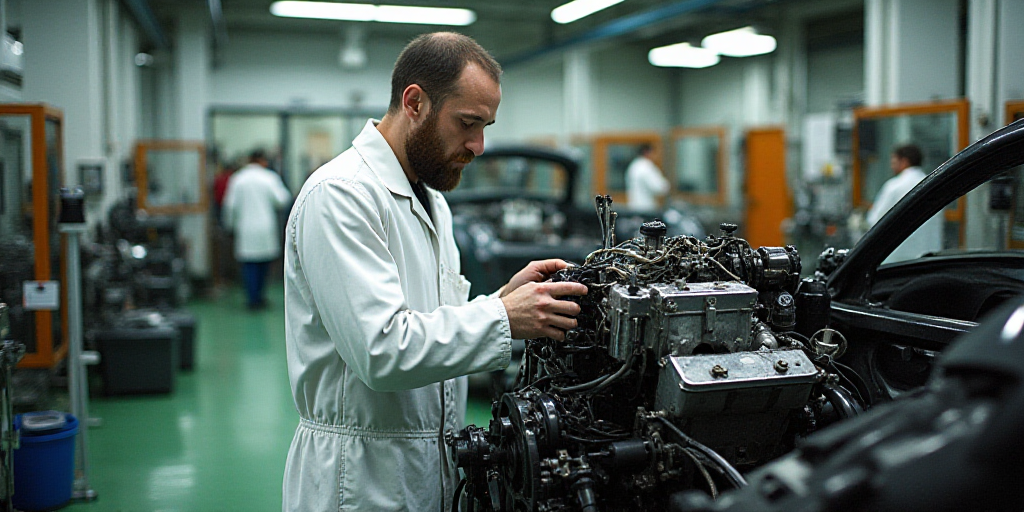Attracting Foreign Direct Investment (FDI) Despite US Tariffs
While the automotive parts sector attracts Foreign Direct Investment (FDI) to Nuevo León by meeting the regional content requirements of the USMCA, many companies choose to keep their projects private to avoid being targeted by potential tariff measures.
Emmanuel Loo, Subsecretary of Investment and Innovation at the Secretariat of Economy, mentioned, “Many companies tell us, ‘I’ll wait (to announce) as they are new and have already started construction and hiring staff; but they say, ‘I don’t want to announce it due to the tariff issue,’ especially American companies. ‘Hey, I’m investing in Nuevo León, please don’t put me in the spotlight because they will later use me as an example.'”
Oatey Latam’s Plant Inauguration: A Case Study
For instance, on July 17, Oatey Latam, a cement dissolvent manufacturer for PVC pipe joining, inaugurated its first plant in Nuevo León. Hernán Lozano, Vice President of the US-based company, stated that 70% of their production will be exported to Latin America and the Caribbean, but declined to disclose the investment amount. Six other companies are setting up their production lines and hiring personnel, projecting to create over 1,000 jobs by the end of 2025, as emphasized by Emmanuel Loo.
Benefits of Complying with USMCA Rules of Origin
The USMCA sets stricter rules of origin for the automotive sector, aiming to encourage regional production. To avoid tariffs when exporting within North America, vehicles must meet the regional content rule—75% of a vehicle’s, light truck, and essential auto parts’ value must originate from the USMCA region.
Emmanuel Loo highlighted that KIA Mexico, located in Pesquería, continues to grow in exports due to its efficiency and compliance with 98% regional content, making it the most integrated assembler among light vehicle assemblers.
“German car brands exporting from Mexico are suffering a lot because they lacked sufficient local supplier integration. Previously, they paid 2.5% tax and brought much procurement from Europe; now they must contribute with 25% tariff,” the official stressed.
Lower Tariffs on Automatic Data Processing Machines
Among the chapters paying lower tariffs are automatic machines for data and processing unit assembly. This sector has seen a strong increase in exports so far, and it’s estimated that this could be the source of a second wave of nearshoring, as some supply comes from Asia, and factories might move to Mexico or nearby locations due to the US-China trade war.
Emmanuel Loo emphasized, “Nuevo León already has major players in this sector like Lenovo, Quanta, Foxconn, who have expanded and the state continues to grow in this sector.”
FDI Captured by Nuevo León: A Closer Look
According to the National Registry of Foreign Investments (RNIE) by the Federal Secretariat of Economy, updated to the first quarter of 2025, the formally registered Foreign Direct Investment (FDI) amounts in Nuevo León during the current administration are as follows, in millions of dollars:
- 2021: $4,026.2
- 2022: $4,397.3
- 2023: $2,537.5
- 2024: $2,098.2
- 1T 2025: $2,674.2
The Nuevo León government has indicated that since 2021, over 400 investment projects totaling more than $73 billion have been announced, with varying stages of planning, development, or installation. These projects are not yet reflected in federal records but clearly indicate the state’s attractiveness and investor confidence.
The discrepancy between state and federal investment figures is mainly due to different methodological criteria. Many Nuevo León investments are not counted as FDI in federal records, such as industrial warehouse or land leasing, which does not involve the purchase of fixed assets. Another case is when a foreign parent company installs machinery in the state but pays directly from its origin country; this capital does not formally enter Mexico and is not recorded by the Secretariat of Economy.
¿How will Nuevo León continue to attract capital? “We are almost on par with last year’s FDI, we know this will continue, I recently visited three companies, representing 3,000 jobs to be created; we are still experiencing the nearshoring effect, but with increasing value addition and creating high-impact jobs,” Emmanuel Loo concluded.






